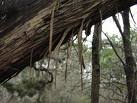Break Cedar Tree Information
Images of Break Cedar:






Break Cedar grows in the following 6 states and provinces:
Arkansas, Colorado, Maine, Missouri, Oklahoma, TexasInformation about Break Cedar:
The Juniperus Ashei is commonly known as the Ashe Juniper, Brake Cedar, Break Cedar, Cedro, Enebro, Mexican Juniper, Mountain Cedar, Ozark White Cedar, Post Cedar, Rock Cedar, Sabino, Tascate, Texas Cedar as well as Texate.
The accepted scientific name for Ashe juniper is Juniperus ashei Buchholz. Ashe juniper is thought to hybridize with redberry juniper (J. pinchotii) . Adams and Kistler summarized a number of studies that investigated the report that Ashe juniper hybridizes with eastern redcedar (J. virginiana) . They concluded that there was no evidence of gene flow between the two species, even though their ranges overlap, and morphological intermediates exist. There are no recognized subspecies, forms, or varieties of Ashe juniper.Ashe juniper has a limited range in southwestern North America. It occurs in disjunct populations in southwestern Missouri and Arkansas, in the Arbuckle Mountains of southern Oklahoma, and in Coahuila, Mexico. The main population occurs in west-central Texas, largely on the Edwards Plateau .Ashe juniper forms dense to open communities with oaks (Quercus spp.), including live oak (Q. virginiana) and Mohr oak (Q. mohriana), Texas persimmon (Diospyros texana), and mesquite (Prosopis spp.). These communities have invaded many acres of adjacent little bluestem (Schizachyrium scoparium) grasslands as a result of overgrazing and fire suppression . Publications which list Ashe juniper as a dominant or codominant species include: Utilization of grass- and shrublands of the southwestern United States . A comparison of some woody upland and riparian plant communities of the southern Edwards Plateau . An ecological comparison of upland deciduous and evergreen forests of central Texas . North American shrublands .Some of the information provided here is attributed to:Sullivan, Janet. 1993. Juniperus ashei. In: Fire Effects Information System, [Online]. U.S. Department of Agriculture, Forest Service, Rocky Mountain Research Station, Fire Sciences Laboratory (Producer). , available at the USDA Fire Effects Information System (FEIS) website